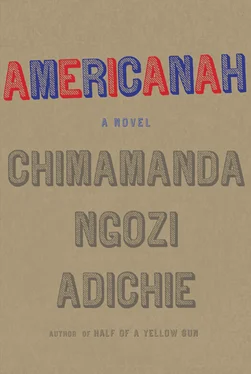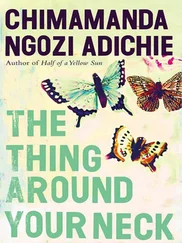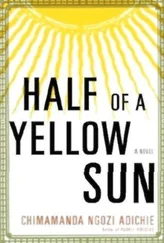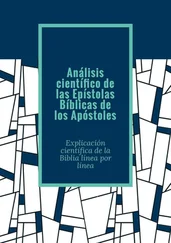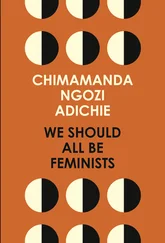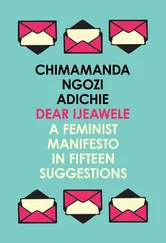But Ifemelu could see, from Aisha’s face, that she understood very well. Aisha was simply a true market woman, immune to the cosmetic niceties of American customer service. Ifemelu imagined her working in a market in Dakar, like the braiders in Lagos who would blow their noses and wipe their hands on their wrappers, roughly jerk their customers’ heads to position them better, complain about how full or how hard or how short the hair was, shout out to passing women, while all the time conversing too loudly and braiding too tightly.
“You know her?” Aisha asked, glancing at the television screen.
“What?”
Aisha repeated herself, and pointed at the actress on the screen.
“No,” Ifemelu said.
“But you Nigerian.”
“Yes, but I don’t know her.”
Aisha gestured to the pile of DVDs on the table. “Before, too much voodoo. Very bad. Now Nigeria film is very good. Big nice house!”
Ifemelu thought little of Nollywood films, with their exaggerated histrionics and their improbable plots, but she nodded in agreement because to hear “Nigeria” and “good” in the same sentence was a luxury, even coming from this strange Senegalese woman, and she chose to see in this an augury of her return home.
Everyone she had told she was moving back seemed surprised, expecting an explanation, and when she said she was doing it because she wanted to, puzzled lines would appear on foreheads.
“You are closing your blog and selling your condo to go back to Lagos and work for a magazine that doesn’t pay that well,” Aunty Uju had said and then repeated herself, as though to make Ifemelu see the gravity of her own foolishness. Only her old friend in Lagos, Ranyinudo, had made her return seem normal. “Lagos is now full of American returnees, so you better come back and join them. Every day you see them carrying a bottle of water as if they will die of heat if they are not drinking water every minute,” Ranyinudo said. They had kept in touch, she and Ranyinudo, throughout the years. At first, they wrote infrequent letters, but as cybercafés opened, cell phones spread, and Facebook flourished, they communicated more often. It was Ranyinudo who had told her, some years ago, that Obinze was getting married. “Meanwhile o, he has serious money now. See what you missed!” Ranyinudo had said. Ifemelu feigned indifference to this news. She had cut off contact with Obinze, after all, and so much time had passed, and she was newly in a relationship with Blaine, and happily easing herself into a shared life. But after she hung up, she thought endlessly of Obinze. Imagining him at his wedding left her with a feeling like sorrow, a faded sorrow. But she was pleased for him, she told herself, and to prove to herself that she was pleased for him, she decided to write him. She was not sure if he still used his old address and she sent the e-mail half expecting that he would not reply, but he did. She did not write again, because she by then had acknowledged her own small, still-burning light. It was best to leave things alone. Last December, when Ranyinudo told her she had run into him at the Palms mall, with his baby daughter (and Ifemelu still could not picture this new sprawling, modern mall in Lagos; all that came to mind when she tried to was the cramped Mega Plaza she remembered)—“He was looking so clean , and his daughter is so fine,” Ranyinudo said — Ifemelu felt a pang at all the changes that had happened in his life.
“Nigeria film very good now,” Aisha said again.
“Yes,” Ifemelu said enthusiastically. This was what she had become, a seeker of signs. Nigerian films were good, therefore her move back home would be good.
“You from Yoruba in Nigeria,” Aisha said.
“No. I am Igbo.”
“You Igbo?” For the first time, a smile appeared on Aisha’s face, a smile that showed as much of her small teeth as her dark gums. “I think you Yoruba because you dark and Igbo fair. I have two Igbo men. Very good. Igbo men take care of women real good.”
Aisha was almost whispering, a sexual suggestion in her tone, and in the mirror, the discoloration on her arms and neck became ghastly sores. Ifemelu imagined some bursting and oozing, others flaking. She looked away.
“Igbo men take care of women real good,” Aisha repeated. “I want marry. They love me but they say the family want Igbo woman. Because Igbo marry Igbo always.”
Ifemelu swallowed the urge to laugh. “You want to marry both of them?”
“No.” Aisha made an impatient gesture. “I want marry one. But this thing is true? Igbo marry Igbo always?”
“Igbo people marry all kinds of people. My cousin’s husband is Yoruba. My uncle’s wife is from Scotland.”
Aisha paused in her twisting, watching Ifemelu in the mirror, as though deciding whether to believe her.
“My sister say it is true. Igbo marry Igbo always,” she said.
“How does your sister know?”
“She know many Igbo people in Africa. She sell cloth.”
“Where is she?”
“In Africa.”
“Where? In Senegal?”
“Benin.”
“Why do you say Africa instead of just saying the country you mean?” Ifemelu asked.
Aisha clucked. “You don’t know America. You say Senegal and American people, they say, Where is that? My friend from Burkina Faso, they ask her, your country in Latin America?” Aisha resumed twisting, a sly smile on her face, and then asked, as if Ifemelu could not possibly understand how things were done here, “How long you in America?”
Ifemelu decided then that she did not like Aisha at all. She wanted to curtail the conversation now, so that they would say only what they needed to say during the six hours it would take to braid her hair, and so she pretended not to have heard and instead brought out her phone. Dike had still not replied to her text. He always replied within minutes, or maybe he was still at basketball practice, or with his friends, watching some silly video on YouTube. She called him and left a long message, raising her voice, going on and on about his basketball practice and was it as hot up in Massachusetts and was he still taking Page to see the movie today. Then, feeling reckless, she composed an e-mail to Obinze and, without permitting herself to reread it, she sent it off. She had written that she was moving back to Nigeria and, even though she had a job waiting for her, even though her car was already on a ship bound for Lagos, it suddenly felt true for the first time. I recently decided to move back to Nigeria .
Aisha was not discouraged. Once Ifemelu looked up from her phone, Aisha asked again, “How long you in America?”
Ifemelu took her time putting her phone back into her bag. Years ago, she had been asked a similar question, at a wedding of one of Aunty Uju’s friends, and she had said two years, which was the truth, but the jeer on the Nigerian’s face had taught her that, to earn the prize of being taken seriously among Nigerians in America, among Africans in America, indeed among immigrants in America, she needed more years. Six years, she began to say when it was just three and a half. Eight years, she said when it was five. Now that it was thirteen years, lying seemed unnecessary but she lied anyway.
“Fifteen years,” she said.
“Fifteen? That long time.” A new respect slipped into Aisha’s eyes.
“You live here in Trenton?”
“I live in Princeton.”
“Princeton.” Aisha paused. “You student?”
“I’ve just finished a fellowship,” she said, knowing that Aisha would not understand what a fellowship was, and in the rare moment that Aisha looked intimidated, Ifemelu felt a perverse pleasure. Yes, Princeton. Yes, the sort of place that Aisha could only imagine, the sort of place that would never have signs that said QUICK TAX REFUND; people in Princeton did not need quick tax refunds.
Читать дальше
